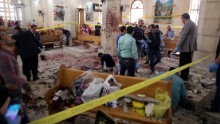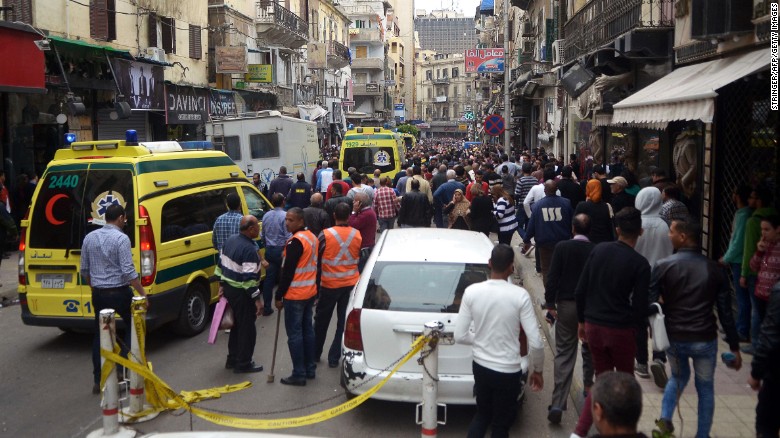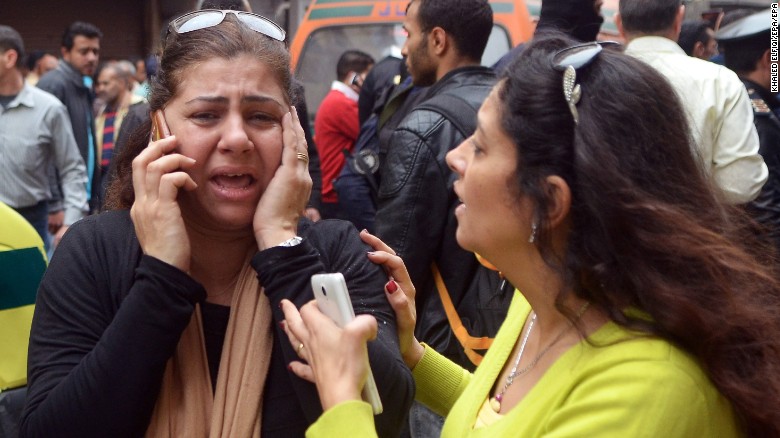By Joe Sterling, Faith Karimi, Mohammed Tawfeeq and Hamdi Alkhshali, CNN
ISIS claimed responsibility for deadly bombings at two Coptic churches in Egypt on Palm Sunday. The attacks targeted a vulnerable religious minority on one of the most important days on the Christian calendar.
The death toll rose to at least 47 early Monday, state media reported.
At least 27 people were killed inside a church in the northern city of Tanta, and at least 16 were killed outside a church in Alexandria. It was not immediately clear at which location the other four were killed.
(ISIS claimed responsibility for bombings that killed dozens at two Coptic churches in Egypt on Palm Sunday. Courtesy of CNN and YouTube)
In a statement issued on the Telegram messaging platform and circulated by several ISIS supporters, the militant group identified the suicide bombers as Egyptian nationals. Egyptian authorities have not confirmed the bombers’ nationalities.
ISIS warned of more attacks in its statement. “The Crusaders and their apostate followers must be aware that the bill between us and them is very large, and they will be paying it like a river of blood from their sons, if God is willing,” the group said in Arabic.
A three-month state of emergency will be declared following the bombing, after legal and constitutional measures have been completed, Egyptian President Abdel Fattah el-Sisi said Sunday.
How the attacks unfolded
The bombings came on the Sunday before Easter, the day that marks the start of Holy Week for Christians.
The first blast ripped through a Palm Sunday service at St. George’s Church in Tanta, killing at least 27 and wounding 78 others, state TV reported.
An explosive device had been planted under a seat in the main prayer hall, it said.
News footage from Tanta showed people gathering at the church, singing hymns. The video then quickly switched to bars as harrowing screams and cries echo in the background.
(Courtesy of koko wawa and YouTube)
“Everything is destroyed inside the church,” said Peter Kamel, who saw the aftermath of the bombing. Its marble pillars were covered with blood, he said.
Kamel said that most of the injured appeared to be priests and members of the choir.
Not long afterward, at least 16 people were killed and 41 others wounded in a suicide bomb attack outside St. Mark’s Coptic Orthodox Cathedral in Alexandria, according to two state news outlets.
Police officers who had been posted outside the church stopped a man wearing an explosive belt from entering the church, the Interior Ministry said.
At least two officers, a man and a woman, were killed, along with civilians and other police staff.
Egyptian blogger Maged Butter said he saw five or six ambulances and bloodstains 100 meters away from the site of the explosion, which happened near the church gate.
He said women were crying and looking for their loved ones and were yelling at police for “not protecting” them.
“Every now and then, I see a person crying — I think they are Christian — and they keep saying: ‘have you seen my family? Have you seen my family?'” Butter said.
Egypt’s response
The Egyptian President declared three days of nationwide mourning following the suicide bombings.
In response to the attack, the country will form a supreme council to counter terrorism and extremism, Sisi said on state television Sunday after an emergency meeting of the country’s National Defense Council.
‘Bodies and body parts everywhere’
Fadi Sami heard about the Tanta bombing as he sat in the Alexandria cathedral on Sunday. The head of Egypt’s Coptic Church, Pope Tawadros II, was leading Palm Sunday prayers.
Though no one announced the Tanta news, Sami said he could hear the sadness in the pope’s voice. He left as the pope finished the sermon.
Twenty minutes later, a suicide bomber blew himself up at the gate of the church.
“I came back and the area was covered in smoke. The stores around the church were all destroyed,” he said.
“There were bodies and body parts everywhere, outside and inside the gate. I saw a man put together what was left of his son in a bag.”
Copts in Egypt have faced persecution and discrimination that has spiked since the toppling of Hosni Mubarak’s regime in 2011.
Dozens have been killed in sectarian violence. In December, an attack at a Coptic church in Cairo killed 25 people.
CNN Map
International condemnation
United Nations Secretary-General António Guterres condemned the attacks and offered his sympathies to the victims and to the country in a statement through a spokesman.
Guterres “wishes a quick recovery to those injured and hopes that the perpetrators of this horrific terrorist act will be swiftly identified and brought to justice,” said the spokesman, Stéphane Dujarric.
The US State Department also issued a rebuke, calling the bombings “barbaric attacks on Christian places of worship.”
“The United States will continue to support Egypt’s security and stability in its efforts to defeat terrorism,” said acting spokesperson Mark Toner.
(Bombs rocked two Coptic churches on Palm Sunday in Egypt, killing more than 40 people and wounding dozens more. ISIS claimed responsibility for the attacks. Courtesy of CBS Evening News and YouTube)
The bombings came days after US President Donald Trump welcomed Sisi to Washington and expressed his support for Egypt.
Among the topics of mutual concern were terrorism and ISIS.
Trump condemned Sunday’s attacks on Twitter and said he has “great confidence Sisi will handle the situation properly.”
(Pope Francis condemns Egypt attacks at Palm Sunday service Courtesy of Fox News and YouTube)
Egyptians mourn, but do they understand?
Pope Francis is scheduled to visit Cairo this month, where he will meet with various religious leaders, including the head of the Coptic Orthodox Church.
He expressed his grief after the church attack.
 Archbishop of Canterbury Justin Welby called the attacks “evil” and urged people to pray for the victims.
Archbishop of Canterbury Justin Welby called the attacks “evil” and urged people to pray for the victims.
Russia’s President Vladimir Putin condemned the attacks and offered his condolences to Sisi, according to Russia’s state-run Tass.
CNN’s Sarah Sirgany, Tamara Qiblawi and Bijan Hosseini contributed from to this report from Abu Dhabi. Ian Lee contributed from Egypt. Darran Simon, Merieme Arif and Susanna Capelouto contributed from Atlanta.
Original post http://edition.cnn.com/2017/04/09/middleeast/egypt-church-explosion/





















